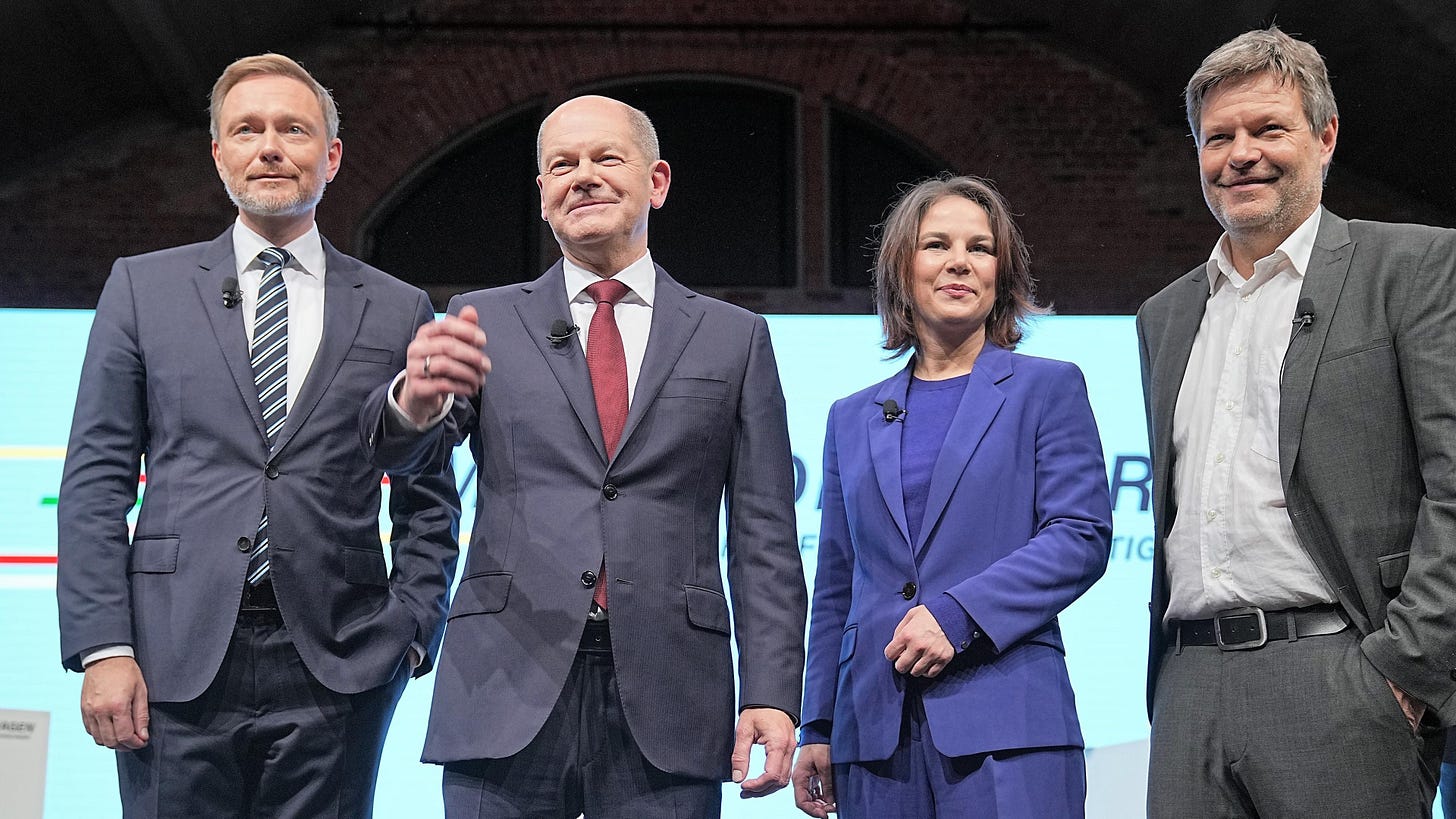A short economic assessment of the KoalitionsVertrag
Open on European integration but ambiguous on domestic fiscal policy
The KoalitionsVertrag just secured by Olaf Scholz ensures a new government to be voted in early December as initially planned. The appointments reflect broadly those that I had mentioned although Cem Ozdemir is not part economy minister contrary to what I had anticipated.
There are two additional roles to be filled, first the BundesBank President (for the SPD) and the future European Commissioner after the European elections in 2024 (for the Greens). This increases the odds of Kukies going to the Bundesbank.
On substance, here are the important messages :
EUROPE
The language on European policy is very encouraging and can be read as the first real German response to Macron’s ambitious integrationist speeches of 2017. Germany clearly calls for an ambitious agenda and considers that Treaty reform is both necessary and desirable. The language on the supremacy of EU law is also very strong and should put to rest tensions with the Constitutional Court.
The coalition calls on the EU to establish a convention to press with European integration and the expansion of qualified majority voting, the creation of transnational lists for the coming European elections and the election of the Commission President on the basis of the Spitzenkandidat process.
While indicating that the RRF was a temporary mechanism, the inter-institutional agreement that calls for own resources to finance it. This means that Germany will press for genuine european own resources, which could pave the way for a true Hamiltonian step in European fiscal integration.
On banking union, the language is somewhat more open than that of the previous coalition but probably not enough to see a major leap. I remain sceptical that EDIS will see the light of day and I continue to think that it is not the highest priority in European financial integration.
Regarding security and defense, Germany clearly responds to France’s ambitious calls for strategic autonomy by calling for a Franco-German defense council and by Europeanizing the decision making process for military intervention.
ECONOMIC POLICY
On economic policy, while there is somewhat pointless reference to monetary policy and the focus of the ECB on price stability, the real news is rather on fiscal policy.
The language on European fiscal rules is deliberately ambiguous and starts by stating that the rules have proven to be flexible enough during the crisi (because they were suspended). It nonetheless, opens the way to reforming them ("developing them further").
The coalition agreement has placed no redlines but it has also not set out a clear commitment/openness to reforming the SGP. This is why what happens with national fiscal policy is critical to set a European precedent.
The Greens had campaigned a clear EUR 50bn of Green investment annually to meet the transition objectives but the coalition agreement is largely void of any numerical commitment.
This suggests that a large part of the financing will come from off balance sheet instruments (PPPs, KfW loans) and it will weigh both on the domestic fiscal multiplier but also limits the ability of other European governments to follow suit.
The reliance on Kfw, notably to assist the energy transition of the private sector and the use of contract for difference for new renewable energy investment all go in the direction of minimizing the public investment footprint. The current agreement seems to hope to finance a part of the green transition under the debt ceiling created by the emergency COVID legislation and therefore not increase the current borrowing planned.
This is potentially concerning because it suggests Germany is gearing up to reintroduce the SGP/Debt brake. But there is a legal debate as to whether this won’t face legal challenge. Indeed, while the Bundestag was voted for this exceptional increase in debt. It was earmarked for COVID related spending, it is not clear that it can be redirected. In any case, the use of that technique suggests very limited willingness to expand Germany’s fiscal space under the debt brake.
After losing the Finance Ministry, the Greens seem to have also lost the battle for a clear green investment commitment.
MISCELLANEOUS
It is quite notable that migration policy will turn even more progressive with important legislation provision for existing migrants and new avenues for citizenship both for people who have lived in Germany for more than 5 years as well as for children born in Germany of foreign parents. This is an important departure from Germany’s citizenship tradition.
The coalition has also decided to legalise cannabis, potentially accelerating the wave of legalisation across Europe.



